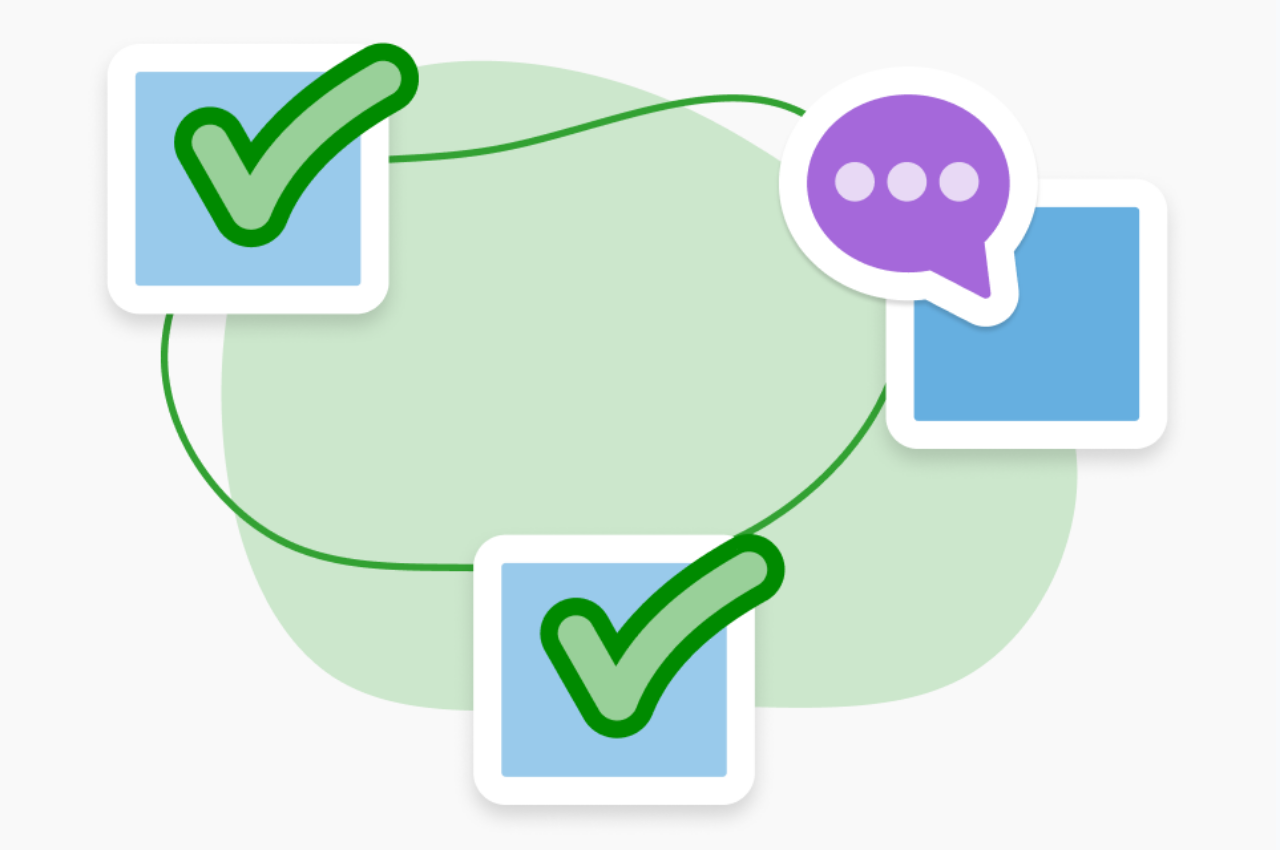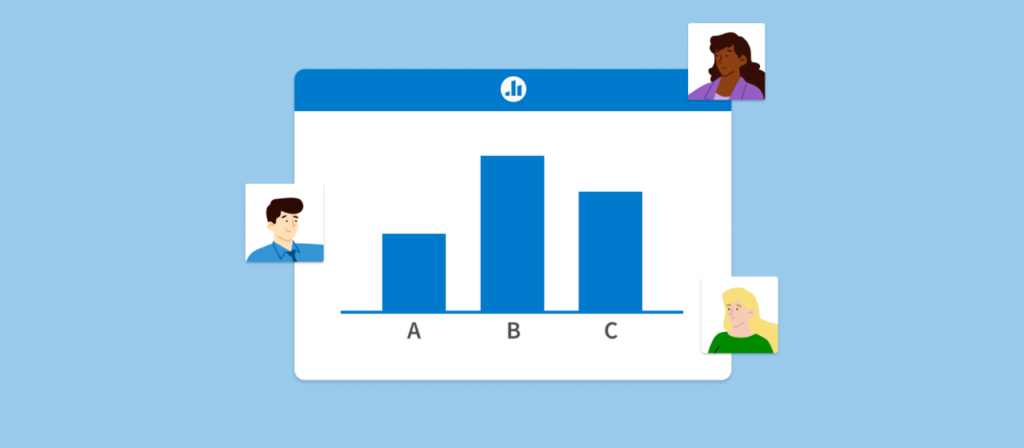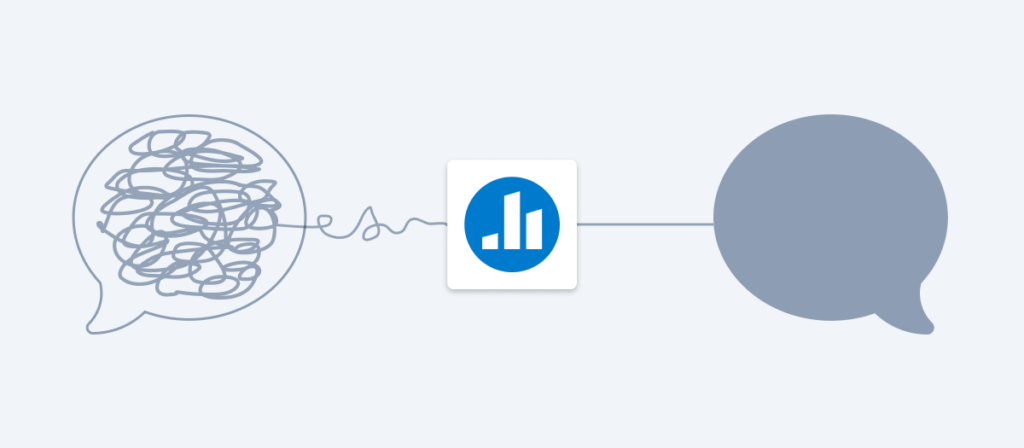20 event survey questions you should ask attendees

Regardless of your industry, a well-run event can be a powerful way to build your brand, educate and invigorate your attendees, and be inspired by some of the top minds in your field.
Bringing people together to learn, network, and develop their professional skills is one of the most authentic and effective forms of marketing—because you’re not just making a sales pitch but you’re offering something in return. According to research from Zippia, as many as 74% of event attendees have a higher opinion of a company or brand after an event while 83% of brands experience a boost in sales from event marketing.
And whether it’s an in-person conference, a webinar, or a hybrid of the two, anyone who’s had a hand in planning a live event can tell you it’s a lot of work. From booking speakers to securing vital infrastructure, there’s a ton of time and thought that goes into planning impactful events.
If you’re going to all the effort of hosting an event in the first place, you want to make sure the experience you’re providing matches up with what your attendees are seeking. You’ll also want to gather insights on what worked well and what didn’t, so you can make improvements or adjustments in the future.
When crafted with the right questions, event surveys are an invaluable tool for understanding your attendees—before, after, and even during the event. Let’s explore some of the questions you should be including in your pre-event, mid-event, and post-event surveys.
Pre-event survey questions
Pre-event surveys help organizers understand attendees’ expectations and preferences and offer insights into where they should focus future marketing efforts. These survey questions can also help speakers gauge their audience’s understanding of certain topics and give audience members the chance to submit questions they hope to have answered. Try to include a mix of multiple- and ranked-choice responses as well as some open-ended questions that can offer respondents the chance to elaborate.
1. Please rank the aspects of this event from most to least important.
By having attendees rank factors like networking, event ambience, hands-on training, inspiring speakers, or cutting-edge content, you can understand your audience’s main motivations for attending and offer an experience to match.
2. What are you hoping to gain from this event?
This open-ended question encourages attendees to sound off on their overall expectations and reasons for attending your event. Asking this beforehand lets you make adjustments to the schedule or prioritize specific aspects to reflect what the majority of attendees hope to accomplish.
3. What speakers/classes are you most excited about?
Putting this question on a pre-event survey can help you predict which events or speakers are likely to be the most popular and better understand the types of learning environments your audience finds most engaging.
4. How did you hear about [event]?
Knowing where your attendees are learning about your event is important for measuring the effectiveness of your marketing efforts. These insights can drive future decisions on communication strategies and media planning.
5. Will you be attending virtually, in-person, or a combination of both?
This question is critical for logistical planning when it comes to event spaces and virtual hosting platforms. Bad connections have been named the #1 annoyance for virtual event attendees, followed closely by microphone and sound issues, so getting a good handle on your technical needs should be a top priority.
6. What are your preferred communication channels?
Letting your attendees specify how they’d like to receive communication and updates around your event adds a nice personal touch and can make people more likely to engage with your content.
7. How would you rate the registration process? Did you run into any issues?
When people encounter problems with signup or checkout on any platform, conversion plummets—which means your attendance does too. This numerical rating with an open-ended question as a follow-up measures how well your registration platform is working and gives people a chance to express any thoughts or frustrations.
8. What is your familiarity with [topic]?
Sending out a pre-lecture assessment to confirmed attendees gives presenters a window into their audience’s knowledge on a certain topic so they can adjust the depth of their content or add additional context.
9. What question(s) do you hope this class can answer?
As an open-ended follow-up to the previous survey question, this gives audience members the opportunity to share what they hope to take away from a certain class or speaker. While it’s unlikely presenters will completely rework their content based on responses to this question, they can consider thoughts from their audience while deciding how to frame key points most effectively.

Mid-event survey questions
Mid-event surveys should be short, as you don’t want to overwhelm your attendees. However, taking the time to listen to your attendees—and take steps to correct any issues when possible—can help your event get better while it’s still happening.
Additionally, with the right tools, mid-event surveys don’t have to wait until after the day’s proceedings. The most engaging events utilize interactive elements to keep conversations flowing between audience and speaker throughout the course of any presentation or training session.
10. How satisfied are you with today’s agenda?
Gathering overall satisfaction data from your attendees provides a nice overview of how well things are going and how your audience is responding to the event so far.
11. Did you run into any issues throughout the day?
Any feedback creates learning opportunities and addressing negative feedback individually and professionally can turn potential detractors into long-term supporters. Sometimes a bit of personal attention is all it takes to defuse a situation.
12. How effective is the event signage in helping you find your way?
Ensuring people can easily find their way around your event is an important part of the overall experience, and improving your directional signage is a relatively quick fix if survey responses tell you that wayfinding issues are common.
13. What would you like to ask [speaker or panel]?
To organize Q&A sessions and make lectures and panel discussions more interactive, presenters or panelists can take questions from the audience with the aid of real-time polling platforms. By enabling in-person and virtual attendees to respond via text, app, or browser window, you can gather questions and insights from throughout the audience, not just the people most likely to get to the microphone.
Post-event survey questions
A post-event survey makes sure your assumptions about the event matches your attendees’ real-world experience. The data and feedback you gather with these survey questions can be a huge help in planning future events, both logistically and in terms of subject matter.
14. How satisfied were you with [event]?
While they’re limited in granularity, overall satisfaction scores are a standard survey question that measures your attendees’ overall happiness with the event. Don’t expect perfection, even if things went really well—75-80% is a good score on a standard five-point scale.
15. How likely are you to attend similar events in the future? Why or why not?
Your respondents’ likelihood of becoming repeat attendees provides a window into whether they find lasting value in whatever you’re offering. Adding an open-ended follow-up encourages people to elaborate on what’s driving their opinion.
16. Please rate your satisfaction with the speakers and workshops. Did any stand out?
Getting a good understanding of how your attendees responded to the presentations and training sessions is important for evaluating your lineup and planning future events. Once again, an open-ended follow-up lets you identify topics or formats that are a hit with your audience so you can deliver even more compelling content next time.
17. Please share your opinion on the length of lectures and learning sessions.
Attention spans are finite and dialing in the length of your presentations and workshops is important if you want to host the best event possible. Gathering opinions on whether your sessions were too long, too short, or just right helps you make necessary adjustments for future events.
18. Did we allow sufficient time for discussion and Q&A?
It can be disappointing to feel rushed through an abbreviated Q&A session with a speaker or panel that you’ve been looking forward to seeing for months. Soliciting input on whether you should be allocating more time at the end of each session helps you improve the participant experience moving forward.
19. What topics would you like to see included in the future at [event]?
Who better to ask for input on future topics than the people you hope to bring back to your event? You can structure this question as a ranked-choice response if there are clear-cut topics relevant to your industry, but we recommend also including an open-ended field in case your attendees have a popular opinion about something you hadn’t considered.
20. Is there anything else you’d like us to consider?
While responses to this question won’t necessarily fit neatly into a data dashboard, giving your respondents an open forum to mention anything that’s on their minds can lead to qualitative feedback that’s well worth considering. Journalists often say that the best quotes come at the very end of an interview, usually in response to a seemingly innocuous question—this is the survey equivalent of the same phenomenon.

If you’re looking to take your next event up a notch, Poll Everywhere offers event plans that make it simple for organizers to design and distribute custom surveys before, during, and after an event. Plus, it enables presenters and workshop leaders to facilitate two-way conversations and gather real-time feedback from their audiences with an intuitive, mobile-friendly interface.
At Poll Everywhere, helping presenters lead more engaging meetings is one of our specialties. Download our free audience engagement ebook for ideas on how to connect with your attendees, keep them enthusiastically participating, and deliver an event they’ll never forget. Create an account and discover the world of audience engagement with Poll Everywhere.
